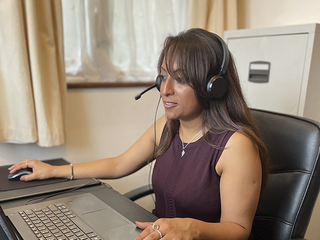Diffuse large B-cell lymphoma (DLBCL) treatment side effects
Treatment for DLBCL and other fast growing lymphomas is usually intensive, and is likely to have some unwanted effects.
What you need to know:
Most people will get some side effects from treatment, although everyone is different.
- Your hospital team can help with side effects, so always tell them how you are feeling.
- Treatment will put you at higher risk of infection – know what to look for and what to do.
- There are some possible delayed effects of treatment to be aware of.
Common side effects
All drugs carry a risk of side effects – unwanted consequences that come along with a drug’s positive effects.
Treatment for DLBCL is often intensive (strong) and you are likely to have some side effects from it. The side effects of DLBCL treatment will vary depending on which drugs you are taking. They will also be personal to you because everyone is different, even if they’re on the same treatment.
Some side effects are fairly common for people having treatment for DLBCL. We have more information about these and other side effects:
- sore mouth and ulcers (mucositis)
- gut problems
- fatigue
- sickness and vomiting
- brain fog
- hair loss
- nerve damage (neuropathy).
If you do notice anything that might be side effect of treatment, tell your hospital team. They will recommend medicines and self-help strategies to ease the symptoms. They may also lower the dose of a particular drug if needed.
Side effects can be tough to cope with at times. It may be helpful to talk to other people with blood cancer about side effects and share experiences and tips. You can do this on our online community forum.
Side effects can affect your mental wellbeing as well as your physical health. Talk to your hospital team if you are feeling low. Or contact our Support Service to find out how to get help.
If you want to know more about side effects
If you want detailed information about the side effects of the drugs you are taking, talk to your hospital team. They will tell you what to look out for and may have printed information to give you.
All drugs come with a patient leaflet which lists side effects according to how common they are. You can find these leaflets on the EMC (Electronic Medicines Compendium) website.
It can be alarming to read a long list of side effects. But drug manufacturers are obliged to include every side effect that’s been reported to them, and that’s why the list is so long.

Worried about anything or have questions?
If you need someone to talk to, please don't hesitate to contact our Support Service by phone or email.
The risk of infection
If you have DLBCL, it’s vital to know that you are at higher risk of infection because the lymphoma stops your immune system working properly.
Treatment affects your immune system too. It can cause neutropenia – a low level of white blood cells called neutrophils which are important for fighting infection.
It’s very important to know what to look out for and what to do if you think you have an infection. Infections can develop very quickly when you have blood cancer, especially while you’re on treatment. They can lead to sepsis, a very serious condition that needs immediate medical help.
Find out what you need to know about infection, neutropenia and sepsis.
Watch our short video about infection symptoms and what to do:
"If you think you have an infection you may be advised to go to A&E. Make sure you tell the staff that you are having treatment for blood cancer and are at high risk of sepsis. If you can, take someone with you to speak on your behalf."
Phil, diagnosed with DLBCL in 2024
Order our free infection alert card for vital information about infection symptoms and what to do.

Supportive care
You may be offered treatment called supportive care. This helps with symptoms and side effects and is given alongside other treatments. Supportive care might include:
- antibiotics to protect you if you are at particularly high risk of bacterial infections
- injections of a drug called GCSF (granulocyte colony stimulating factor) to help you produce more white blood cells
- bisphosphonates to strengthen your bones and ease bone pain
- an antiviral medicine called aciclovir to prevent shingles.
Longer term effects
DLBCL treatment can damage healthy cells as well as lymphoma cells. This brings a risk of other health problems later in life, called late effects. It’s important to be aware of these so you can get the medical help you need.
Always tell any medical professionals you see about the treatment you have had for DLBCL. It’s important even if you don’t think your health issue is related to it and it was a long time ago.
The main late effects of DLBCL treatment are heart problems and second cancers. You can lower your risk of these by living as healthily as you can, including eating a balanced diet and keeping active.
Your hospital team should give you advice about late effects before you are discharged.
Breast cancer screening
There is an increased risk of breast cancer if you have had radiotherapy to the chest as part of your treatment. Most people do not go on to develop breast cancer but you will be invited for breast screening to check on this.
Screening will start between 8 to 15 years after radiotherapy, because that's when the risk starts to increase. We have more information about breast screening.
Fertility problems
Chemotherapy drugs can affect your fertility – your ability to have children. Radiotherapy may also affect your fertility, depending on where it is directed.
If you think you may want to have a child (or more children) in the future, talk to your hospital team. There may be a chance to freeze eggs, tissue from your ovaries, or sperm before you have treatment. This will depend on how quickly treatment needs to start.
We have more information about blood cancer treatment and fertility, including early menopause caused by blood cancer treatment.
Speak to your hospital team or call our Support Service if you are worried about any of possible effects of treatment for DLBCL.
> Back to Treatment for diffuse large B-cell lymphoma (DLBCL)
